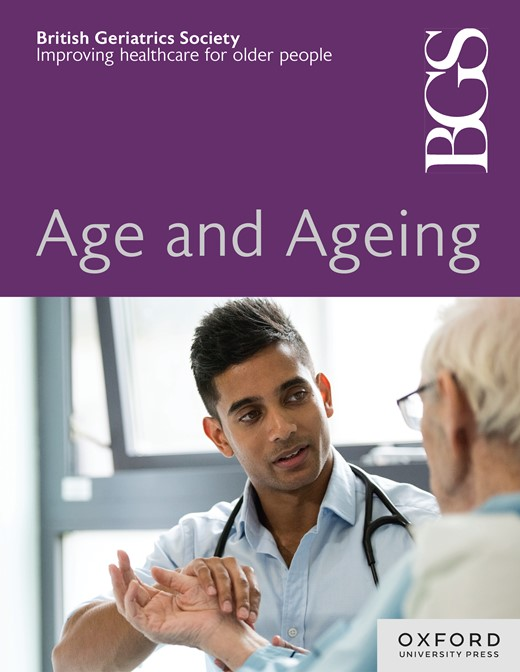Medications associated with dizziness or hypotension and adverse outcomes: an electronic health record study in older adults with dementia
IF 6
2区 医学
Q1 GERIATRICS & GERONTOLOGY
引用次数: 0
Abstract
Background Comorbidities and polypharmacy are common in people with dementia, leading to a higher risk of adverse outcomes. While the impact of anticholinergic properties has been extensively investigated, less is known about other cross-category properties of medications. Objective To investigate whether medications with dizziness or hypotension as a side effect are associated with adverse outcomes in older adults with dementia. Design Retrospective cohort study. Setting and participants From a South London catchment, 15 210 patients diagnosed with dementia between 2008 and 2017. Methods Medications with dizziness and/or hypotension listed as a side effect were compiled and quantified in the cohort. Multivariable Cox regression models were run to determine the risk of mortality, all-cause emergency hospitalisation and hospitalisation due to falls. Generalised estimating equations were applied to investigate cognitive decline. The final model adjusted for 19 potential confounders, including physical and mental health measures. Results Of the patients, 82.2% were receiving at least one dizziness-associated medication and 71.2% at least one hypotension-associated medication. For each additional medication associated with dizziness or hypotension, there was a 4% increased risk of all-cause emergency hospitalisation. No associations were found with hospitalised falls specifically or with mortality or cognitive decline. Conclusion Medications that potentially cause dizziness or hypotension were associated with an increased risk of hospitalisation, although not specifically hospitalisation caused by falls. More systematic attention should be paid to coprescribing around the time of dementia diagnosis and the potential for rationalising this to minimise adverse drug events.与头晕或低血压相关的药物和不良后果:老年痴呆患者的电子健康记录研究
背景:痴呆患者常见合并症和多种用药,导致较高的不良后果风险。虽然抗胆碱能特性的影响已被广泛研究,但对药物的其他跨类别特性知之甚少。目的探讨以头晕或低血压为副作用的药物是否与老年痴呆患者的不良结局相关。设计回顾性队列研究。背景和参与者来自伦敦南部的一个集水区,2008年至2017年期间有15210名患者被诊断患有痴呆症。方法将伴有头晕和/或低血压的药物列为副作用,并在队列中进行汇总和量化。使用多变量Cox回归模型来确定死亡率、全因急诊住院和因跌倒住院的风险。应用广义估计方程来研究认知能力下降。最终的模型调整了19个潜在的混杂因素,包括身体和心理健康指标。结果82.2%的患者接受至少一种眩晕相关药物治疗,71.2%的患者接受至少一种降压相关药物治疗。每增加一种与头晕或低血压相关的药物,全因紧急住院的风险增加4%。没有发现与住院跌倒或死亡率或认知能力下降有特别的联系。结论:可能导致头晕或低血压的药物与住院风险增加有关,尽管不是特别由跌倒引起的住院。应该更加系统地关注痴呆症诊断前后的共同处方,并有可能使其合理化,以尽量减少药物不良事件。
本文章由计算机程序翻译,如有差异,请以英文原文为准。
求助全文
约1分钟内获得全文
求助全文
来源期刊

Age and ageing
医学-老年医学
CiteScore
9.20
自引率
6.00%
发文量
796
审稿时长
4-8 weeks
期刊介绍:
Age and Ageing is an international journal publishing refereed original articles and commissioned reviews on geriatric medicine and gerontology. Its range includes research on ageing and clinical, epidemiological, and psychological aspects of later life.
 求助内容:
求助内容: 应助结果提醒方式:
应助结果提醒方式:


